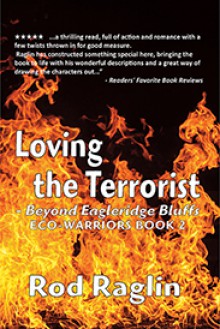
QUESTION: Did you find the plot and the characters in your second novel, Loving the Terrorist, restricted by the confines of this genre?
Despite the lack of success of my first novel, Saving Spirit Bear, my publisher was still keen on publishing two more novels as part of the Eco-Fi series, Eco-Warriors, and I was still keen on writing them. The plan (remember the plan?) appeared flawed, but perhaps not fatally.
As a journalist I'd been following and commenting on a local protest where residents and hardcore environmentalists had joined forces to boycott the development of a highway bypass that would destroy Eagleridge Bluffs, a very rare eco-system, home to migratory birds and at least one endangered species.
Despite a number of other viable options the government was intransigent. In frustration the protestors set up a blockade and eventually were arrested and literally dragged off to jail.
I've spent the best part of my life climbing and hiking in the local mountains. I've seen some awe-inspiring scenery, moments when I truly felt if I died in the presence of such magnificence, well, that would be just fine. But Eagleridge Bluffs was the best.
These ancient rock faces, carved by eons of Pacific storms roaring down Georgia Strait, and decorated by gnarled Arbutus Trees emanated a benign energy that soothed and uplifted the human spirit - no kidding.
When they dynamited The Bluffs they destroyed something very special and to this day I feel guilty. I should have done more to save this wonderful wild place that I loved.
But what could I have done? Loving the Terrorist - Risking it All, is that story.
Miriam is forty and frustrated. In an attempt to enhance her living-just-to-breathe life she joins some neighbours protesting a highway bypass that will destroy Eagleridge Bluffs. Not only are the Bluffs her special sanctuary, they’re also the beautiful home of rare and endangered plants and animals.
The protest gains the support of environmental organizations including the attention of a group of eco-radicals lead by an enigmatic younger man named Zaahir.
Miriam is mesmerized by this charismatic leader and sees him as someone that can save her as well as the Bluffs. But is Zaahir just using Miriam to help him further his radical political agenda?
As legal channels fail and civil disobedience falters, Miriam is seduced into the murky world of eco-terrorism.
The plot of this story follows the actual events that took place over three months that summer - up to a point. I literally lifted dialogue for my characters from news clips and stories. Then I took it further.
I wanted to explore the theme - can violence be condone on behalf of a just cause? Furthermore, is violence effective?
I wanted a sympathetic villain because as an author if you have a political agenda (and boy, did I) the only way to keep from sounding didactic is to also present it from the point of view of the anatgonist - and do it fairly. I gleaned this from Robert Boswell's book, The Half-Known World: On Writing Fiction. Not only does this approach work, it was a good idea since I wasn't quite sure where I stood on this issue myself.
I took the criticism of my first novel to heart and "sexed up" this one. This presented a challenge and I wondered how I could write explicitly about sex without it being gratuitous? I decided to make Miriam a virgin, her lover fifteen years younger than her, and she white and him brown. My idea was to let my readers discover sex along with my heroine.
I hit most of the points including a "Happy Ever After" ending but even as I was writing the novel I could tell I was straying beyond the confines of the romance genre. Despite the ending, this wasn't a happy story, how could it be - innocent creatures were wiped out, a beautiful, spiritual place was destroyed, and for no good reason (as if there ever is one).
I couldn't help it, I couldn't change it. It bombed, but I felt better.
By the time Loving the Terrorist was published I was well into the third novel for the Eco-Warriors series. By now I'd learned quite a bit about writing and publishing and even more about myself. This would be my last romance.
I knew I was leaving genre even as I was writing Not Wonder More, Mad Maggie and the Mystery of the Ancients. I was also becoming increasingly dissatisfied with my publisher (and no doubt, she with me) and had begun exploring other options.
Next Question: Did your third novel Not Wonder More, Mad Maggie and the Mystery of the Ancients resolve the issue of whether to write genre or literary fiction? And what about your publisher?


 Log in with Facebook
Log in with Facebook 









